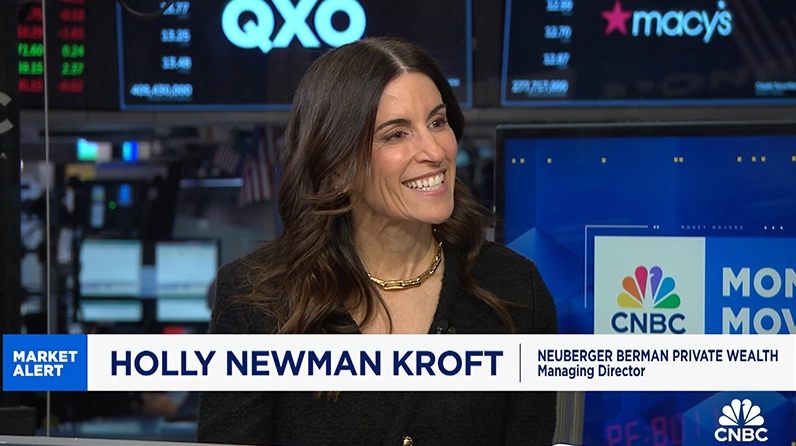

We are seeing an important shift in the landscape of personal wealth as women are taking the driver’s seat on decision-making and planning.
At first glance, it seems obvious that women are very different from men, but the distinctions take on an added dimension when it comes to money. Women not only differ in the way they spend their wealth but also in how they choose to invest and distribute it to fulfill their priorities and values. Over the next three to five years, it is estimated that women will inherit $30 trillion globally1, potentially creating a seismic shift of the investment landscape. Importantly, women are not just inheriting wealth; they are also creating it—building businesses, becoming primary family breadwinners and joining the C-suite in increasing numbers. To us, this will make the future “much more female.”
Inheritors
In the past, women took control of wealth largely through inheritance, and that remains a key factor today due to survivorship trends: women outlive their male spouses by five to 10 years, on average, and make up 85% of those 100 years of age or older2.
Importantly, we see women taking a more active role in their financial lives. Women account for 85% of the spending in the average household, and control about a third of U.S. financial assets. Across all wealth brackets, they will inherit 70% of global wealth over the next two generations and will likely manage two-thirds of household wealth by 20303. And when it comes to investments, women will likely not be content to simply stay the course: roughly 70% of women change financial advisors within a year after the death of their spouse4, and they typically have distinctive views on how to approach planning and investments.
Wealth Creators
There have always been female entrepreneurs, but a more level playing field and better opportunities are expanding their presence as wealth creators and primary breadwinners across the economic landscape. The Forbes 2022 billionaires list, for example, included 327 women out of a total of 2,668, worth a collective $1.56 trillion—some based on inheritance, others driven by traditional “sweat equity.”
Although the gender pay gap has remained fairly stable over the past 20 years (as of 2020, women earned 83% of what men earned, on average), there are signs of change. For example, young women are out-earning young men in some key U.S. cities, including New York City and Washington, D.C.5 Educational trends could also heighten female earnings power: more women than men are on college campuses today and more women are being admitted at higher rates each year. Already, women account for nearly 60% of enrollment6.
Investment Preferences and Priorities
What does this mean for wealth management? Studies have consistently shown that women’s goals and attitudes about money are often distinct from those of men. Female investors often have a greater focus on goals and objectives beyond investment returns. They generally prioritize planning for retirement, healthcare needs, wealth transfer to their children and philanthropic intentions. Eighty percent of women currently lead or participate in decisions about family wealth. This highlights the importance of understanding and appreciating the priorities of female investors, and in particular their preferences when it comes to planning. At our firm, we have found that the women in the room are more focused on connection and meaning, which is reflected in family and philanthropic interests.
Contrary to the popular belief that women are more risk-averse, research suggests that women are willing to take risks but prefer that they be calculated and fully understood. This suggests the value of building confidence and aligning investment strategies with women's objectives. Additionally, there is growing interest among women in environmental, social and governance (ESG) investing. Women prefer to invest in organizations aligned with their personal values, such as those with diverse senior leadership and strong track records in ESG matters. According to Cerulli Associates, about 52% of U.S. women would prefer to invest in businesses with beneficial social or environmental impacts, compared to 44% of men, while S&P Global found that 43% of women across 11 countries believe a company’s stance on social or environmental concerns is ”very important” when considering whether to invest7.
Trends and Opportunities
We see a tremendous opportunity to serve female investors, in light of their desire to engage with advisors differently, and understand their greater focus on personalized wealth planning and values-aligned investing. Offering strategies that appeal to women and are aligned with their values can help an underserved marketplace.
While the financial industry recognizes the importance of serving women investors, there is still much work to be done. To better serve female investors, firms need to build diverse organizations and client-facing teams; they should focus on the technical skills required to deliver a broader array of capabilities as well as the interpersonal skills necessary to enhance communication, listening and building trust with female clients.
Navigating a Sea Change
At a time when change seems to come in leaps and bounds, the growing power of women investors is a welcome, if not unexpected, development. Although it is easy to overgeneralize, we understand that many women see money and planning quite differently from men. With that in mind, we believe it is important to provide services and strategies that can align closely with their priorities. In our view, women investors should increasingly expect that level of care and attention, as they take a more active role in, and in many cases drive, family wealth management decisions.


INSIGHTS
CIO Notebook: Payrolls to the Wings as Tariffs Take Center Stage

INSIGHTS
CIO Notebook: Risk Assets Under Pressure as Trump Expands Tariffs

VIDEO
Holly Newman Kroft Discussed Market Uncertainty on CNBC

VIDEO
Celebrating Women’s History Month 2025

INSIGHTS
CIO Notebook: Fed Holds Rates Steady but Projections Reflect Policy Uncertainty

INSIGHTS
Private Equity in Perspective: Navigating Extremes and Unlocking Long-Term Value

INSIGHTS
CIO Notebook: Cooler Inflation Calms Nerves but Tariffs Still Loom Large
Accolades
Our Advisors Ranked in “Barron’s Top 1,200 Financial Advisors” List for 2025
INSIGHTS
CIO Notebook: Light U.S. Payrolls Close Out a Noisy Week
MARKET COMMENTARY
Trade Debates While Markets Rotate
INSIGHTS
U.S. Tariffs Hit Markets as Growth Questions Emerge
VIDEO
Holly Newman Kroft Joined CNBC to Discuss Market Outlook
Accolades
Forbes | SHOOK 2025 Top Women Wealth Advisors
1Cerulli Associates, The Cerulli Report - U.S. High-Net-Worth and Ultra-High-Net-Worth Markets 2021: Evolving Wealth Demographics.
2McKinsey & Co., “Women as the next wave of growth in U.S. wealth management,” June 29, 2020.
3Capgemini, 2022 Wealth Management World Report.
4McKinsey & Co., “Women as the next wave of growth in U.S. wealth management,” June 29, 2020.
5Source: Fox, Michelle, “16 U.S. cities where women under 30 earn more than their male peers,” CNBC.com, March 31, 2022.
6Source: National Student Clearinghouse Research Center.
7Source: Iacurci, Greg, CNBC.com, “Women prefer values-based investing. Here’s what that might mean for their wealth,” June 24, 2022.
This material is provided for informational and educational purposes only and nothing herein constitutes investment, legal, accounting or tax advice. This material is general in nature and is not directed to any category of investors and should not be regarded as individualized, a recommendation, investment advice or a suggestion to engage in or refrain from any investment-related course of action. Investment decisions and the appropriateness of this material should be made based on an investor's individual objectives and circumstances and in consultation with his or her advisors. Neuberger Berman, as well as its employees, does not provide tax or legal advice. Information is obtained from sources deemed reliable, but there is no representation or warranty as to its accuracy, completeness or reliability. All information is current as of the date of this material and is subject to change without notice. Any views or opinions expressed may not reflect those of the firm as a whole. This material may include estimates, outlooks, projections and other “forward-looking statements.” Due to a variety of factors, actual events may differ significantly from those presented. Neuberger Berman products and services may not be available in all jurisdictions or to all client types. Diversification does not guarantee profit or protect against loss in declining markets. Investing entails risks, including possible loss of principal. Past performance is no guarantee of future results.
A Portfolio’s application of ESG criteria is designed and utilized to help identify companies that demonstrate the potential to create economic value or reduce risk; however as with the use of any investment criteria in selecting a portfolio, there is no guarantee that the criteria used by the Portfolio will result in the selection of issuers that will outperform other issuers, or help reduce risk in the portfolio. The use of the Portfolio’s ESG criteria could also affect the Portfolio’s exposure to certain sectors or industries, and could impact the Portfolio’s investment performance depending on whether the ESG criteria used are ultimately reflected in the market.
Neuberger Berman Investment Advisers LLC is a registered investment adviser. The “Neuberger Berman” name and logo are registered service marks of Neuberger Berman Group LLC.